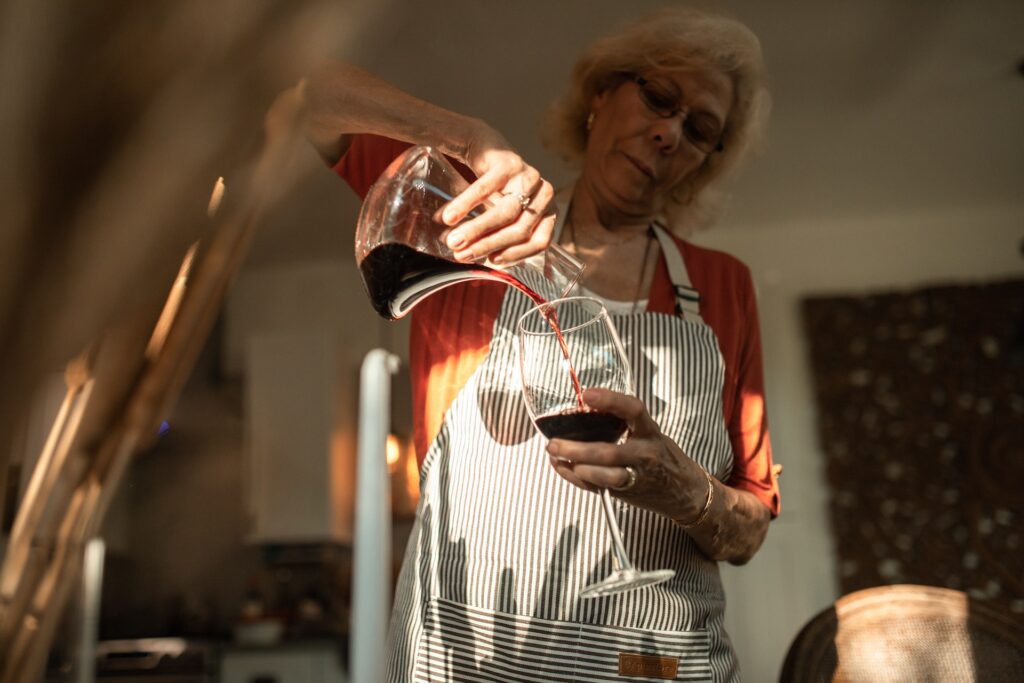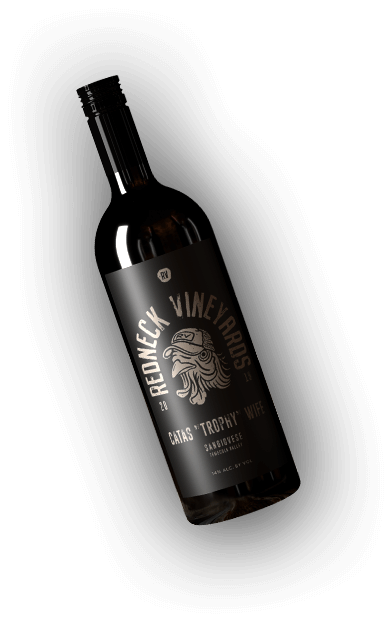Wine, Wine Tasting
Decanting Times
Have you ever heard someone say they’ll let a wine “breathe”? If so, they likely used a decanter to enhance the wine’s flavor and expand its aromas.
While decanting may seem overwhelming, once you learn the basics, it’s pretty simple and can significantly affect a wine’s characteristics.
Ready to try it for yourself? Want to know when to decant wine and for how long? Here’s what you need to know to nail it every time.
What Is Decanting?
If you often order bottles of wine in restaurants, you have likely encountered a decanter. You may even have one at home that you’re dying to use but are unsure when or how long to use it.
Decanting wine entails slowly pouring wine from a bottle into a different container. The goal is to pour without disturbing sediment. Most commonly, decanters are glass vessels with necks that make it easy to pour wine from the container into a glass. There are many types, including duck, swan, and cornett decanters.
The main reasons to decant wine include:
- Enhancing flavor through aeration
- Saving a bottle if a cork breaks
- Separating sediment from liquid
How Long Should You Decant Wine?
Once you pour wine into a decanter, how long do you have to wait before you can enjoy it? Can you wait too long? When is the best time to decant wine?
The answers to these questions are as complex as the wine itself. However, the most straightforward explanation will depend on the wine you’re serving and the conditions.
For example:
- Red wines should be decanted between 20 minutes to two hours, depending on the variety of red
- Whites and rosés should be decanted for up to 30 minutes, depending on conditions (the same applies to sparkling wines)
Decanting red wines
Nearly all reds benefit from decanting. This process makes reds taste smoother and fruitier thanks to evaporation and oxidation.
- Decant light-bodied red wines such as Pinot Noir and Gamay for 20-30 minutes
- Decant medium-bodied red wines, such as Merlot, Malbec, Grenache, and Zinfandel, for 30-60 minutes
- Decant full-bodied red wines, such as Cabernet Sauvignon and Syrah, for 60+ minutes
Decanting white and rosé wines
Most whites and rosés do not need to be decanted, and in some cases, taking this step can lessen your experience — especially concerning a wine’s aromatics. For example, a delicate Sauvignon Blanc may offer hints of passionfruit, but these aromas may be lost if decanted.
Since this step is not typically necessary, you’ll only want to decant a white or rosé wine if it shows signs of reduction. A tell-tale sign that wine is reduced is the smell of burnt matches. However, another sign is a lack of aromas. Your wine may be reduced if you only pick up on mineral-like scents and no fruit-forward aromas. Sometimes it’s a simple fix. Pouring the wine into a glass and waiting 15-20 minutes can bring the aromas to life.
Full-bodied white wines with a funky taste (think steamed mushrooms) also benefit from decanting. Although not always, these are often rich varietals produced in cooler climates, such as a white Bourgogne (most commonly made with Chardonnay grapes). In this case, decanting for around 30 minutes will often do the trick.
The need to decant sparkling wines is rare.
Other scenarios that benefit from decanting
- Old wines — If a wine is 20+ years old, decant it immediately before serving. Old wines are sensitive, so take a sip. If it tastes balanced, cork it until it’s time to serve. If it doesn’t, test it over 30 minutes to see if it improves.
- Natural wines — Natural wines often have a burnt smell because of reduction. In this case, decant for 20 minutes. Sadly, if that doesn’t help, you may have a bad bottle of wine.
- Orange wines — An orange wine is a type of white wine produced by leaving the grape skins and seeds in contact with the juice. These wines have tannins and benefit from decanting. Just 15-30 minutes should suffice.
Can You Decant a Wine Too Long?
Unfortunately, yes, you can. When a wine has been decanted for too long, it will smell like vinegar.
When wine is stored in a bottle, it is in an environment with very low oxygen levels. When you decant, a wine introduces oxygen, releasing flavors and aromas. This process can improve your tasting experience. However, exposure to oxygen can also increase the rate of chemical reactions, causing the wine to degrade. Chemical reactions cause rising levels of acetic acid — the same acid in vinegar.
Additional Decanting Tips
With wine, there is often a lot of trial and error involved. The more knowledgeable you become, the more confident you’ll be with the wines you choose and how you serve them.
Here are a few additional tips to boost your decanting knowledge so that you know the best time to decant wine.
- The younger and more tannic a bottle of wine is, the longer it should be decanted. Some of the most tannic wines include Cabernet Sauvignon, Syrah, Malbec, Sangiovese, and Nebbiolo.
- If you have a “closed” bottle of red, it’s not showing much character — its flavors and aromas are either muted or overpowered by alcohol, tannins, acidity, etc. To help improve the aromas and flavors, double decant the bottle. Pour the wine from the bottle into a decanter, back into the bottle, and repeat as needed.
- If you want to speed up the process, wine aerators are a great solution, but not for aged wines.
- Although timelines vary, most red wines will last 12-18 hours after decanting.
Experiment With Wines From Sweet Oaks
Whether hosting a wine tasting party or planning a special night for you and a loved one, having a decanter on hand will help you better explore your wines.
Now that you know when to decant wine, Sweet Oaks has plenty of options. Shop our selection of quality wines to find your favorites, or schedule your next tasting today!![]()



